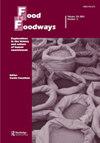反思:食物是快乐还是压力?大流行的护理政治
IF 1.2
Q2 ANTHROPOLOGY
引用次数: 2
摘要
摘要在无偿护理经济中,快乐和压力是一枚硬币的两面。食物是我们审视新冠肺炎大流行期间1月护理特征的镜头。基于定性实证研究结果,我们认为时间对于人们在为自己、家庭和更广泛的社区提供食物时是否经历矛盾、快乐或约束至关重要。在德国柏林,疫情封锁以及学校和儿童保育设施的关闭导致花费在家庭护理工作上的时间和精力增加。这种护理工作仍然是女性化的。女性站在组织日常生活和发明新的时间管理策略的最前沿,如增加网上购物、加强跑腿计划、一起做饭和享受美食,或参与当地的食品网络。疫情期间时间节奏的改变为重新评估护理和将护理组织为一项共同责任提供了潜力,但从长远来看,这种重组将如何发展仍存在疑问。对于未来,对食品的经济研究最终必须将关爱实践纳入其评估中,因为它们是个人和社会福祉的支柱,需要相当长的时间,尤其是女性。本文章由计算机程序翻译,如有差异,请以英文原文为准。
Reflection: Food as pleasure or pressure? The care politics of the pandemic
Abstract Pleasure and pressure are two sides of the same coin when it comes to the unpaid care economy. Food is the lens through which we examine the Janus-faced character of care during the Covid-19 pandemic. Based on qualitative empirical findings, we argue that time is crucial to whether people experience ambivalence, joy or constraints in providing food for the self, the family and the wider community. In Berlin, Germany, the pandemic lockdown and closing of schools and childcare facilities led to an increase of time and energy spent on care work in the household. This care work has remained feminized. Women are at the forefront of organizing daily routines and inventing new strategies to manage time such as increased online shopping, intensified planning of errands, cooking and enjoying meals together, or becoming involved in local food networks. The altered temporal rhythms during the pandemic offer potential for the revaluation of care and for organizing care as a shared responsibility, however it remains questionable how this reorganization will evolve in the long run. For the future, the economic study of food must finally include caring practices in its valuation since they are the backbone of individual and societal well-being and demand considerable time, especially from women.
求助全文
通过发布文献求助,成功后即可免费获取论文全文。
去求助
来源期刊

Food and Foodways
ANTHROPOLOGY-
CiteScore
2.20
自引率
0.00%
发文量
16
期刊介绍:
Food and Foodways is a refereed, interdisciplinary, and international journal devoted to publishing original scholarly articles on the history and culture of human nourishment. By reflecting on the role food plays in human relations, this unique journal explores the powerful but often subtle ways in which food has shaped, and shapes, our lives socially, economically, politically, mentally, nutritionally, and morally. Because food is a pervasive social phenomenon, it cannot be approached by any one discipline. We encourage articles that engage dialogue, debate, and exchange across disciplines.
 求助内容:
求助内容: 应助结果提醒方式:
应助结果提醒方式:


